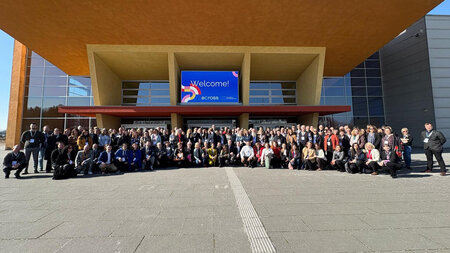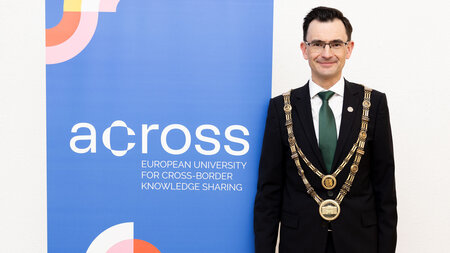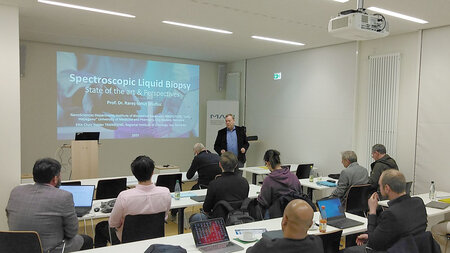Home, City Layers and Global Shakespeares
The English Department at the TU Chemnitz has scored a hat-trick with three consecutive publications in winter 2015
-

Will hanging out in Colaba by Prof. Dr. Cecile Sandten. This painting is also on the title-page of her book, Shakespeare’s Globe, Global Shakespeares. Colaba is a district of Mumbai, India.
The term hat-trick is used when a footballer scores three goals in a single game. The Chair of English Literatures at TU Chemnitz has achieved something similar by publishing three books – two edited volumes and one monograph – in winter 2015. The three books present the results of a longstanding scholarly engagement at the Chair of English Literatures with urbanity and theories of space/spatiality. They were published with Wissenschaftlicher Verlag Trier in the CHAT series (Chemnitzer Anglistik/Amerikanistik Today), edited by Prof. Dr. Cecile Sandten and Prof. Dr. Evelyne Keitel.
No place like home?
The 14 articles collected in the volume Home: Concepts, Constructions, Contexts, edited by Cecile Sandten and Kathy-Ann Tan, attempt to mobilise the otherwise static concept of “home” by detaching it from its semantic horizon as a place of origin, resort, and refuge. As a result, “home” becomes legible as a space of possible change, change that is the consequence of political histories, social ideologies and specific cultural contexts. Understood thus, “home” appears as a construct, and the rules of its construction as negotiable.
Not only do the authors in this edited collection explore the rules of construction of “home”, they also investigate the consequences of failed constructions. What happens “When Home Fails Us”, as one article asks in its title? And what if one’s “home” turns into a place of traumatic experience, of persecution, displacement, and repression? The questions addressed in this volume certainly contribute to a more nuanced understanding of the situation of the large number of refugees who have had to leave their homes and who are now trying to settle in Europe.
Layers of a City
The focus of Eike Kronshage, Cecile Sandten, and Winfried Thielmann’s edited volume Palimpsestraum Stadt [The City as Palimpsest] is on urban spaces and the specific ways in which they can be read. The term “palimpsest” refers to an ancient practice of producing writing material: Once a text had been inscribed on a wax tablet, it was covered with a fresh layer of wax so that the tablet could be reused for future inscriptions. Yet, the former text shone through the new layer, so that the old and new text became simultaneously legible. The editors of this bilingual volume contend that urban spaces with their temporal, spatial, and cultural layers are legible in a similar manner.
The thirteen articles gathered in this volume address a great variety of topics to offer a comprehensive view on layered urban spaces including medieval cities, the metropolises of the nineteenth and twentieth centuries, as well as the contemporary cities in which we live today. The diversity of topics is a result of the longstanding research conducted by the research network “Palimpsestraum Stadt” at the TU Chemnitz. Therefore, it comes as no surprise that the city of Chemnitz, with its complex history and its numerous (re-)constructions, is the foremost object of interest in many of the contributions.
Global Shakespeares: All the World’s a Stage
Prof. Dr. Cecile Sandten’s monograph, Shakespeare’s Globe, Global Shakespeares, investigates the spatial movement from the center of early modern English literature, London’s Globe Theatre, to the so-called periphery of the former British Empire, especially Africa, Canada, the Caribbean, and India - and back again. With its focus on mutual dialogue, Sandten replaces the traditional schematic model of original “center” and subsequent “periphery” with a dynamic transcultural model that both emphasises the aesthetic autonomy of so-called “rewritings”, and points out the reciprocity of this (trans)cultural process of exchange.
In addition to its considerable spatial reach, Sandten’s book is also unique in comprising different genres of Shakespearean rewritings: plays, poetry, and prose. According to Sandten, the prominent position that Shakespeare holds in the Western canon is due to his importance as a global thinker who considered, as a famous passage in As You Like It demonstrates, “All the world [as] a stage” (2.7). Against this backdrop, Sandten convincingly expands the image of the Globe’s Shakespeare to that of multiple global Shakespeares.
(Author: Eike Kronshage)
Mario Steinebach
07.03.2016





